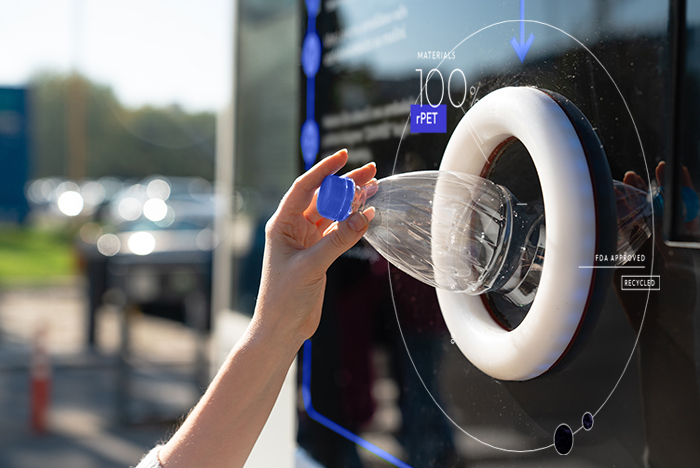Recycling Myths Debunked: Separating Fact from Fiction
11.10.2023
11.10.2023

Have you ever read a recycling “fact” that made you scratch your head and wonder… is that really true?
There’s a lot of conflicting information on the internet and beyond about recycling, and it can be difficult to distinguish between what is true and what’s not. In this blog, we’re going to take a look at some common recycling myths and get to the bottom of them. Let’s debunk a few recycling myths and separate what’s fact from fiction.
Recycling creates a ripple effect that benefits the environment in a multitude of ways. When individuals and companies recycle, they are keeping reusable materials out of landfills and in the economy to circulate once again. Recycling also increases the amount of feedstock for companies that transform recycled materials into new products, which lessens the demand for the natural resources that are used to make virgin materials. The extraction process for natural resources can be very taxing on the environment, and the equipment used to perform these extractions releases emissions into the atmosphere. Luckily, recycling cuts back on much of this damage and uses a fraction of the energy that it takes to create virgin materials.
False
Even though many plastic products have a recycling symbol with a code, not all plastics are easily recycled. Polyethylene terephthalate (PET), recycling code 1, and high-density polyethylene (HDPE), recycling code 2, are the most common plastics that you’ll find in regular household items — so it only makes sense that they are the most easily recycled plastics. Almost any recycling facility that accepts plastics will accept these two. However, not all plastics are made equal with regard to their recycling ease. Plastics with the recycling code 7, miscellaneous plastics, are rarely recycled. Additionally, polystyrene (PS), code 6, and polyvinyl chloride (PVC), code 3, can both be recycled sometimes, but many recycling centers do not accept it. Instead, these less common plastics may need to be taken to a specialty center to be properly recycled.
Not Exactly
Landfills are not designed so that trash can decompose quickly. In fact, landfills are built so that trash can be buried — not broken down. If you aren’t familiar with landfills, it may be easy to assume that it’s just a big hole in the ground where trash is tossed. However, it’s more complicated than that. There are several layers along the sides of a landfill that limit the oxygen exposure to the waste that’s inside, so decomposition is nearly impossible. The reason for this is so that groundwater is not contaminated from trash breaking down.
Even if plastics were in an environment where the material could break down more quickly, it would never truly decompose. While other products, such as food waste or paperboard, will eventually decompose under the right conditions, plastics merely break down into smaller and smaller pieces, known as microplastics. Microplastics have become so commonplace that they are even being found in various parts of the human body. This is one of many reasons why recycling plastic or disposing of it properly is crucial for our health.
Not Always
What about plastic, you may be wondering? With advances in recycling technology producing higher-quality recycled products, some plastics can be recycled more than once before losing their structural integrity. Even when plastics are no longer fit to be remade into items like water bottles, they are still useful in creating other household goods, including upholstery, clothing, and rugs.
Not anymore!
Years ago, some of the earliest products made from commercially recycled materials were noticeably inferior to products made from virgin materials. They were thinner, less visually appealing, and often less durable than their non-recycled counterparts. These days, that’s no longer the case. Modern consumers are demanding to see more recycled packages and products on the market, which means that companies have to deliver. Because of the increased demand, there have been incredible strides in the quality of goods made from post-consumer recyclables — with some even rivaling the quality of products made with non-recycled materials.
At Verdeco, we’ve heard the demand for quality, recycled materials and are creating effective solutions across many applications to meet current needs in the market. Read more about Verdeco solutions here.
False
As recycling innovations get better over time and demand grows for recycled materials, recycling is becoming more economically viable by the year. Recycling contributes to a global economy — recyclables are bought and sold around the world to companies that use recyclables to create new products. Additionally, recycling facilities and new recycling companies employ thousands of people across the country and around the world. And, in some instances, it can be more cost-effective for companies to create products with recycled materials than with virgin materials. In many ways, recycling makes great sense economically, and it’s only getting more viable with time.
At Verdeco, our innovative recycling solutions are effective, consumer-oriented, and positioned to solve real-world problems. We employ dedicated workers and groundbreaking thought leaders who are creating recycled plastic with the same quality as virgin plastics. Our rPET can withstand the same conditions as PET with the same aesthetic appeal and without losing any of its structural integrity. These innovations are helping to make a strong case for recycled products and the recycling industry as a whole — we’re ready to bust these myths.
To learn more about how Verdeco is changing the world, visit verdecorecycling.com
Elevate your commitment to sustainability while upholding your high standards of quality. Talk with us today to discover the possibilities.